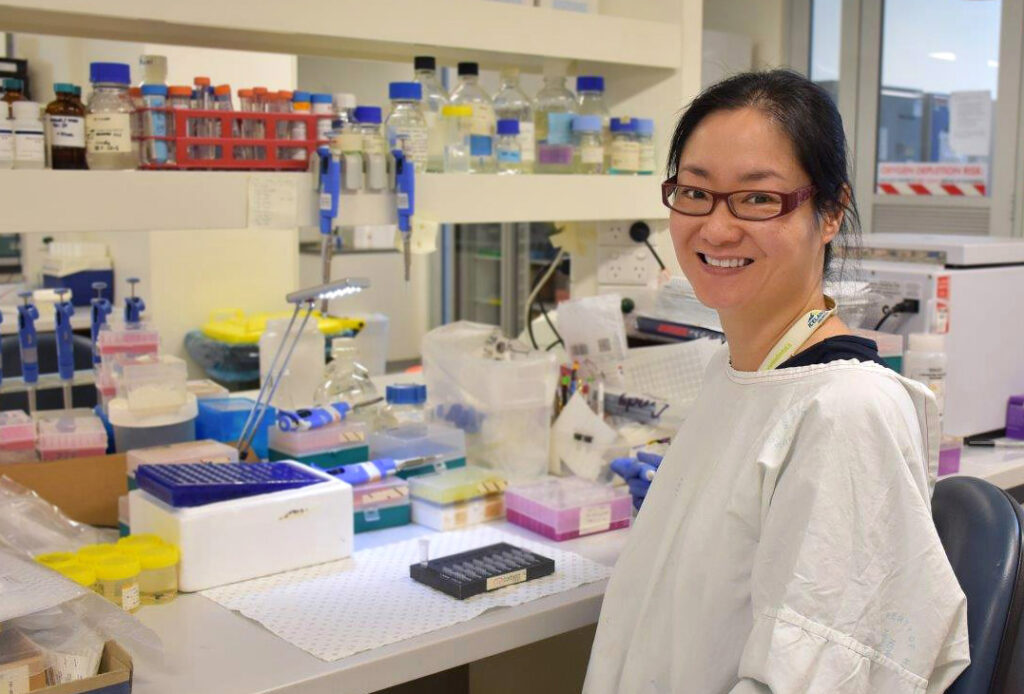
Dr Cindy Shu, Postdoctoral Lab Scientist at the Raymond Purves Bone and Joint Research Laboratory talks to the NORTH Foundation about her experience as an early career researcher, as well as why she believes that research has the power to change the world.
For Dr Cindy Shu, a career in medical research is how she can help make the world a better place – one molecule at a time.
Raised by a mother living with rheumatoid arthritis, Dr Shu has seen first hand how the disease causes severe pain and swelling to her mother’s joints and how it impacts her ability to live a “normal” life. Determined to understand her mother’s medical reports, Dr Shu embarked on university studies in biological sciences.
“My mother’s rheumatoid arthritis motivated my decision to pursue a career in medical research – not out of ambition for a cure or treatment for her complex illness, but to understand the specialist and medical terminologies so I could best support her in her diagnosis and treatment.”
While at university, Dr Shu was involved in a project that looked at ways to improve the healing of burn wounds. Inspired by the long-term impact research can have on the community, Dr Shu says that this experience was the catalyst in her decision to pursue a career in medical research – specifically musculoskeletal research.
In 2008, Dr Shu joined Professor Christopher Little’s musculoskeletal research group at the Kolling Institute and has since worked as part of the Raymond Purves Bone and Joint Research Laboratory for more than a decade.

Dr Cindy Shu
The musculoskeletal research group at the Kolling Institute looks at diseases concerning musculoskeletal health – investigating everything from joint diseases to intervertebral disc degeneration to tendon pathologies.
For the last five years, Dr Shu’s research focus has been on osteoarthritis (OA) – particularly how the cells in the cartilage, called chondrocytes, respond to injury and how the joint degeneration happens over time. One of the key parts of her research is identifying whether the progression of OA in patients can be stopped or slowed by targeting a molecule for therapeutic treatment.
Recently, Dr Shu’s team made a research discovery that linked OA with cardiovascular disease that has been a pivotal shift in her research focus.
“Studies showed that OA stands as an independent risk factor to a person developing heart disease, even after correcting all the likely traditional risk factors that cause heart disease, such as BMI, smoking, high blood pressure and lifestyle choices.”
“As such, there is clearly a factor causing this that we haven’t identified yet. We believe that if we uncover how the joint talks to the heart and create a targeted treatment that slows or prevents OA progression, this will additionally protect people with OA from developing a serious heart condition in the future.”
Many people would be surprised to hear that OA is the leading cause of disability in the world, with 1 in 11 Australians suffering from OA, and cardiovascular disease affecting more than 4 million Australians. Dr Shu feels strongly that her purpose is to make a difference to the world with research.
“We want to see a world where people can go off and play tennis or even go for a run without having to worry about joint pain. With such a breakthrough, our research will positively impact the health and wellbeing of individuals in the community.”
Reflecting on her journey so far, Dr Shu’s advice for others contemplating a career in medical research or just wondering how they can make a positive impact on the community, is to continue to be curious.
“Be curious and brave as it will drive you to discover and gain new knowledge – this will fuel your passion.”
Dr Shu says that her curiosity and learning from her network, mentors and peers have been crucial in the progression of her research surrounding OA and cardiovascular disease.
“We have had access to human-derived heart cells and serum from patients who had a joint replacement, and then cultured these together in vitro to look at how it changes the cells’ gene expression.”
From conducting this investigation, Dr Shu and her team have found that many genes that are associated with heart health were affected by the serum collected from patients with OA. Dr Shu believes that there’s something in the serum that’s communicating to the heart cells to cause these changes, so she is continuing to focus her research on this area in a first of its kind study.
Although Dr Shu’s research continues to progress, there is still a long way to go as she requires funding for research costs and equipment to undertake and continue the life-changing research project to completion.
“I will continue to develop and drive my research interest in OA and apply my laboratory skills in a pre-clinical capacity because I believe that my research can change the world.”
By choosing to make a monthly donation, you can help us provide long-term strategic funding within the Kolling Institute. If you are interested in directly supporting Dr Shu and her team at the Kolling Institute, please click here.

